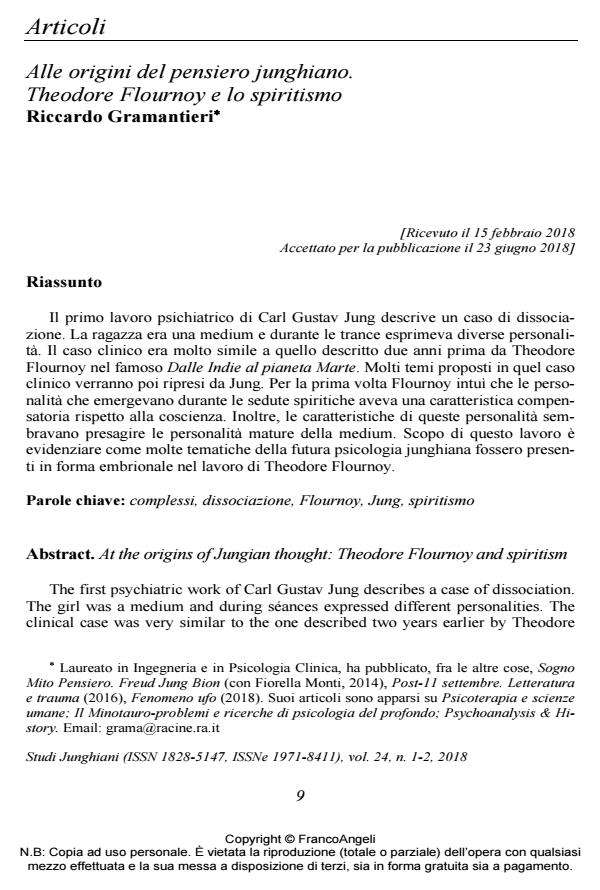At the origins of Jungian thought: Theodore Flournoy and spiritism
Journal title STUDI JUNGHIANI
Author/s Riccardo Gramantieri
Publishing Year 2018 Issue 2018/47-48
Language Italian Pages 21 P. 9-29 File size 223 KB
DOI 10.3280/JUN2018-047002
DOI is like a bar code for intellectual property: to have more infomation
click here
Below, you can see the article first page
If you want to buy this article in PDF format, you can do it, following the instructions to buy download credits

FrancoAngeli is member of Publishers International Linking Association, Inc (PILA), a not-for-profit association which run the CrossRef service enabling links to and from online scholarly content.
The first psychiatric work of Carl Gustav Jung describes a case of dissociation. The girl was a medium and during séances expressed different personalities. The clinical case was very similar to the one described two years earlier by Theodore Flournoy in his famous From India to the Planet Mars. Many themes proposed in that clinical case will be taken up by Jung. For the first time, Flournoy sensed that the personalities that emerged during séances had a compensatory characteristic respect to consciousness. Furthermore, the characteristics of these personalities seemed to presage mature personalities of the medium in the future. The aim of this work is to highlight those themes of the future Jungian psychology that were present in an embryonic form in the work of Theodore Flournoy.
Keywords: Complexes, dissociation, Flournoy, Jung, spiritism
- Flournoy T. (1891). Activité psychique et physiologie générale. Revue Philosophique, 30: 506-509.
- Flournoy T. (1900). Des Indes a la planete Mars: étude sur un cas de somnambulisme avec glossolalie. Paris: Seuil (trad. it. Dalle Indie al pianeta Marte: Il caso Hélène Smith dallo spiritismo alla nascita della psicoanalisi. Milano: Feltrinelli, 1985).
- Flournoy T. (1901). Nouvelles observations sur un cas de somnambulisme avec glossolalie, Extrait des Archives de Psychologie de la Suisse Romande, Tome 1, n. 2: 101-255.
- Flournoy T. (1903). Archives de Psychologie 2: 85-86.
- Freud S. (1899). Die Traumdeutung (trad. it. L’interpretazione dei sogni. In: Opere, vol. 3. Torino: Boringhieri, 1967).
- Goodheart W. (1984). C.G. Jung’s First Patient. Journal of Analytical Psychology, 29: 1-34. DOI: 10.1111/j.1465-5922.1984.00001.x
- Giacomelli R. (2006). Lo strano caso della signora Hélène Smith. Spiritismo, glossolalia e lingue immaginarie. Milano: Libri Scheiwiller.
- Gramantieri R. (2018). Fenomeno ufo. Milano, Udine: Mimesis, 2018.
- Gramantieri R., Monti F. (2014). Sogno Mito Pensiero. Freud Jung Bion. Bologna: Persiani.
- Hogenson G.B. (2004). Archetypes: emergence and the psyche’s deep structure. In: Cambray J., Carter L., eds. Analytical Psychology. Contemporary perspectives in Jungian analysis. Naove and New York: Brunner-Routledge: 32-55.
- Jaffé A., a cura di (1961). Erinnerungen, Träume, Gedanken von C.G. Jung. Zürich: Rascher Verlag (trad. it. Ricordi, sogni, riflessioni di C.G. Jung. Milano: Rizzoli, 2012).
- Jung C.G. (1897a). Alcuni pensieri sulla psicologia. In: Le conferenze della Zofingia. Roma: Ma.Gi 2004: 57-85.
- Jung C. G. (1897b). Discorso inaugurale come presidente della Zofingia nel semestre invernale 1897-98. In: Le conferenze della Zofingia. Roma: Ma.Gi 2004: 89-95.
- Jung C.G. (1902). Zur Psychologie und Pathologie sogenannter occulter Phänomene (trad. it. Psicologia e patologia dei cosiddetti fenomeni occulti. In: Opere, vol. 1. Torino: Boringhieri 1970).
- Jung C.G. (1905). Kryptomnesie (trad. it. Criptomnesia. In: Opere, vol. 1. Torino: Boringhieri, 1970).
- Jung C.G. (1907). Über die Psychologie der Dementia praecox (trad. it. Psicologia della dementia praecox. In: Opere, vol. 3. Torino: Boringhieri, 1971).
- Jung C.G. (1913-1929) [2009]. The Red Book. Liber novus. London: Routledge (trad. It. Il libro rosso. Liber novus. Edizione studio. Torino: Bollati Boringhieri 2012).
- Jung C.G. (1920). Die psychologischen Grundlagen des Geisterglaubens (trad. it. I fondamenti psicologici della credenza negli spiriti. In: Opere, vol. 8. Torino: Boringhieri, 1976).
- Jung C.G. (1921). Psychologische Typen (trad. it. Tipi psicologici. In: Opere, vol. 6. Torino: Boringhieri, 1969).
- Jung C. G. (1924 [1926]). Analytische Psychologie und Erziehung (trad. it. Psicologia analitica ed educazione. In: Opere, vol. 17. Torino: Boringhieri, 1991).
- Jung C.G. (1925 [1989]). Analytical Psychology: Notes on the Seminar Given in 1925 (trad. it. Psicologia analitica: appunti del seminario tenuto nel 1925. Roma: Ma.Gi, 2006).
- Jung C.G. (1928). Die Beziehungen zwischen dem Ich und dem Unbewussten (trad. it. L’io e l’inconscio. In: Opere, vol. 7. Torino: Boringhieri, 1983).
- Jung C.G. (1933-34). Modern Psychology. Notes on Lectures given at the Eidgenössische Techibnische Hochschule, vol. 1-2. Zürich: K. Schippert & Co., 1959.
- Jung C.G. (1934). Die praktische Verwendbarkeit der Traumanalyse (trad. it. L’applicabilità pratica dell’analisi dei sogni. In: Opere, vol. 16. Torino: Boringhieri, 1981).
- Jung C.G. (1934-54). Über die archetypen des kollektiven Unbewussten (trad. it. Gli archetipi e l’inconscio collettivo. In: Opere, vol. 9.1. Torino: Boringhieri, 1980).
- Jung C.G. (1936). Über den Archetypus mit besonderer Berücksichtigung (trad. it. Sull’ar che tipo, con particolare riguardo al concetto di Anima. In: Opere, vol. 9.1. Torino: Boringhieri, 1980).
- Jung C.G. (1939). Bewusstsein, Unbewusstes und Individuation (trad. it. Coscienza, inconscio e individuazione. In: Opere, vol. 9.1. Torino: Boringhieri, 1980).
- Jung C.G. (1948). Address on the Occasion of the Founding of the C.G. Jung Institute (trad. it. Discorso tenuto in occasione della fondazione dell’“Istituto Carl Gustav Jung. In: Opere, vol. 17. Torino: Boringhieri, 1993).
- McGuire W., a cura di (1974). The Freud-Jung Letters. The Correspondence between Sigmund Freud and C.G. Jung. Princeton: Princeton University Press (trad. it. Lettere tra Freud e Jung. Torino: Boringhieri, 1974).
- Migone P. (2010). Terapia psicoanalitica. Milano: Franco Angeli.
- Nucciotti A. (2011). Jung e la psicosi. Il Minotauro, 38, 2: 35-56.
- Shamdasani S. (2003). Jung and the making of modern psychology. Cambridge, Uk, New York: Cambridge University Press (trad. it. Jung e la creazione della psicologia moderna. Roma: Edizioni Scientifiche Ma.Gi., 2007).
Riccardo Gramantieri, Alle origini del pensiero junghiano. Theodore Flournoy e lo spiritismo in "STUDI JUNGHIANI" 47-48/2018, pp 9-29, DOI: 10.3280/JUN2018-047002